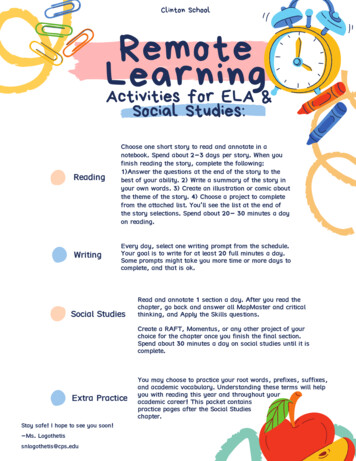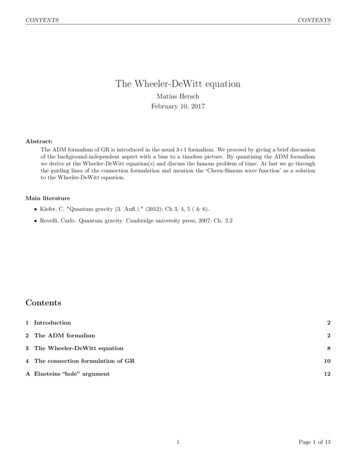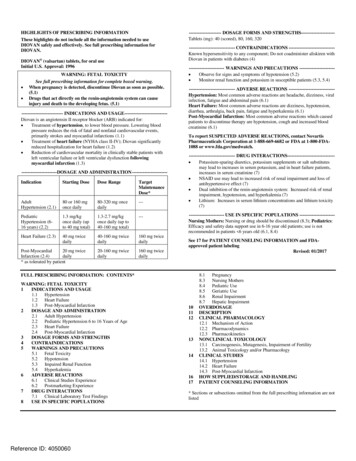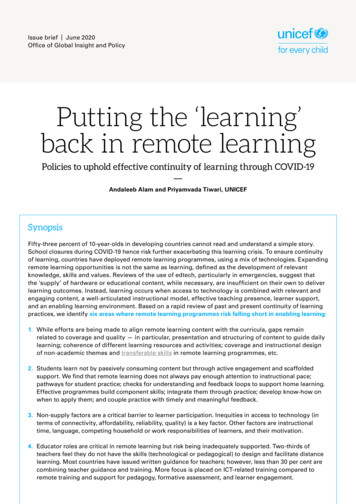
Transcription
Clinton SchoolRemoteLearningActivities for ELA &Social Studies:ReadingWritingChoose one short story to read and annotate in anotebook. Spend about 2-3 days per story. When youfinish reading the story, complete the following:1)Answer the questions at the end of the story to thebest of your ability. 2) Write a summary of the story inyour own words. 3) Create an illustration or comic aboutthe theme of the story. 4) Choose a project to completefrom the attached list. You'll see the list at the end ofthe story selections. Spend about 20- 30 minutes a dayon reading.Every day, select one writing prompt from the schedule.Your goal is to write for at least 20 full minutes a day.Some prompts might take you more time or more days tocomplete, and that is ok.Social StudiesRead and annotate 1 section a day. After you read thechapter, go back and answer all MapMaster and criticalthinking, and Apply the Skills questions.Create a RAFT, Momentus, or any other project of yourchoice for the chapter once you finish the final section.Spend about 30 minutes a day on social studies until it iscomplete.Extra PracticeStay safe! I hope to see you soon!-Ms. Logothetissnlogothetis@cps.eduYou may choose to practice your root words, prefixes, suffixes,and academic vocabulary. Understanding these terms will helpyou with reading this year and throughout youracademic career! This packet containspractice pages after the Social Studieschapter.
Writing PromptsExpectations & ScheduleWriting helps us exercise our critical thinking skills. In a writing notebook, spend at least 20 full minutes a day responding to one of these writing prompts. Monitor yourpunctuation and grammar as you write your responses. Make sure your responses are structured with an introduction, body, and conclusion.WEEK 1Day 1MondayWrite a poem aboutresponsibilities.Day 2TuesdayDay 3WednesdayDay 4ThursdayWrite a news reportabout something thathappened in the lastweek of your life.Write about a deepand meaningfulconversation you hadwith a relativerecently.What is yourgreatest belief, andwhy do you feelstrongly about this?Day 5FridayWhat is a problemyou want solved inthe world, and howwould you solve it?WEEK 2Day 1MondayIdentify an object inyour home and writea myth about thisobject.Logothetis ‘20Day 2TuesdayDay 3WednesdayDay 4ThursdayDay 5FridayContinue with yourmyth from yesterday.How might youdevelop thisextraordinary storyaround an ordinaryobject?Write a review abouta TV show or moviethat you sawrecently. What was itabout? Why wouldyou recommend it?Write aboutsomething you wishyou could do moreoften. What stopsyou from doing this?Is there anything youcan do to changethat?If you could travelback in time andchange any one thingabout your past,would you? If so,what would youchange and why? Ifnot, why wouldn’tyou?
Name:Class:The Story of Prometheus and Pandora's BoxBy James Baldwin1895James Baldwin (1841-1925) was an educator and prolific children's book author who re-wrote many classiclegends and myths for young readers. In almost every culture, there are myths and folktales that explainhow the world got to be the way it is today and that ask important questions about the human condition.Greek mythology in particular has been read widely in the West and retold in sophisticated high poetry. Inthis version, however, James Baldwin adopts a more accessible tone, turning revered Greek Mythology intoold Greek stories. As you read, take notes on how Baldwin reveals the themes of these myths.I. How Fire Was Given to Men[1]In those old, old times, there lived two brotherswho were not like other men, nor yet like those1Mighty Ones who lived upon the mountain top.2They were the sons of one of those Titans who3had fought against Jupiter and been sent in4chains to the strong prison-house of the Lower5World.The name of the elder of these brothers wasPrometheus, or Forethought; for he was alwaysthinking of the future and making things readyfor what might happen to-morrow, or next week,or next year, or it may be in a hundred years tocome. The younger was called Epimetheus, orAfterthought; for he was always so busy thinkingof yesterday, or last year, or a hundred years ago,that he had no care at all for what might come topass after a while."Torch" by J.E. Theriot is licensed under CC BY 2.0.For some cause Jupiter had not sent thesebrothers to prison with the rest of the Titans.1.2.3.4.5.The "Mighty Ones" is a reference to the gods and goddesses of Greek mythology who lived atop Mount Olympus, ledby Zeus (or, in Roman mythology, Jupiter), god of sky and thunder and king of the gods.In classical Greek mythology, the Titans were members of the second order of divine beings, born from the first godand goddess Gaia and Uranus. The Titans were giants of incredible strength who ruled during the legendary GoldenAge.Jupiter (also called Jove) is the god of sky and thunder and king of the gods in Ancient Roman religion and mythology.This is a reference to Tartarus, a deep abyss in ancient Greek mythology that is used as a dungeon of torment andsuffering for the wicked. Zeus/Jupiter sent most of the Titans there after he and the other gods of Olympus defeatedthe Titans in a power struggle.In mythology, the Lower World – also known as the Underworld – is an otherworld where souls go after death.1
Prometheus did not care to live amid the clouds on the mountain top. He was too busy for that. While67the Mighty Folk were spending their time in idleness, drinking nectar and eating ambrosia, he wasintent upon plans for making the world wiser and better than it had ever been before.[5]He went out amongst men to live with them and help them; for his heart was filled with sadness whenhe found that they were no longer happy as they had been during the golden days when Saturn was8king. Ah, how very poor and wretched they were! He found them living in caves and in holes of theearth, shivering with the cold because there was no fire, dying of starvation, hunted by wild beasts andby one another-the most miserable of all living creatures.“If they only had fire,” said Prometheus to himself, “they could at least warm themselves and cook theirfood; and after a while they could learn to make tools and build themselves houses. Without fire, theyare worse off than the beasts.”Then he went boldly to Jupiter and begged him to give fire to men, that so they might have a littlecomfort through the long, dreary months of winter.“Not a spark will I give,” said Jupiter. “No, indeed! Why, if men had fire they might become strong andwise like ourselves, and after a while they would drive us out of our kingdom. Let them shiver withcold, and let them live like the beasts. It is best for them to be poor and ignorant, that so we MightyOnes may thrive and be happy.”Prometheus made no answer; but he had set his heart on helping mankind, and he did not give up. Heturned away, and left Jupiter and his mighty company forever.[10]9As he was walking by the shore of the sea he found a reed, or, as some say, a tall stalk of fennel,10growing; and when he had broken it off he saw that its hollow center was filled with a dry, soft pithwhich would burn slowly and keep on fire a long time. He took the long stalk in his hands, and startedwith it towards the dwelling of the sun in the far east.“Mankind shall have fire in spite of the tyrant11who sits on the mountain top,” he said.He reached the place of the sun in the early morning just as the glowing, golden orb was rising fromthe earth and beginning his daily journey through the sky. He touched the end of the long reed to the12flames, and the dry pith caught on fire and burned slowly. Then he turned and hastened back to hisown land, carrying with him the precious spark hidden in the hollow center of the plant.He called some of the shivering men from their caves and built a fire for them, and showed them howto warm themselves by it and how to build other fires from the coals. Soon there was a cheerful blaze13in every rude home in the land, and men and women gathered round it and were warm and happy,and thankful to Prometheus for the wonderful gift which he had brought to them from the sun.6.7.8.9.10.11.12.Idleness (noun): a state of inactivity; not doing anything productiveNectar and ambrosia are the food and drink of the “Mighty Folk” in Greek mythology.“Saturn” is the Roman name for the Greek god Cronus (also spelled Kronos), the leader and youngest of the firstgeneration of Titans. He overthrew his father and ruled during the mythological Golden Age, until he was overthrownby his own son Zeus/Jupiter and imprisoned in Tartarus.a kind of plantthe white strings inside a plant or fruit like an orangeTyrant (noun): an unjust or oppressive rulerHasten (verb): to hurry2
It was not long until they learned to cook their food and so to eat like men instead of like beasts. Theybegan at once to leave off their wild and savage habits; and instead of lurking in the dark places of theworld, they came out into the open air and the bright sunlight, and were glad because life had beengiven to them.[15]After that, Prometheus taught them, little by little, a thousand things. He showed them how to buildhouses of wood and stone, and how to tame sheep and cattle and make them useful, and how to plow14and sow and reap, and how to protect themselves from the storms of winter and the beasts of the15woods. Then he showed them how to dig in the earth for copper and iron, and how to melt the ore,and how to hammer it into shape and fashion from it the tools and weapons which they needed inpeace and war; and when he saw how happy the world was becoming he cried out:“A new Golden Age shall come, brighter and better by far than the old!”II. How Diseases and Cares Came Among MenThings might have gone on very happily indeed, and the Golden Age might really have come again, hadit not been for Jupiter. But one day, when he chanced to look down upon the earth, he saw the firesburning, and the people living in houses, and the flocks feeding on the hills, and the grain ripening inthe fields, and this made him very angry.“Who has done all this?” he asked.And some one answered, “Prometheus!”[20]“What! That young Titan!” he cried. “Well, I will punish him in a way that will make him wish I had shut16him up in the prison-house with his kinsfolk. But as for those puny men, let them keep their fire. I willmake them ten times more miserable than they were before they had it.”Of course it would be easy enough to deal with Prometheus at any time, and so Jupiter was in no greathaste about it. He made up his mind to distress mankind first; and he thought of a plan for doing it in avery strange, roundabout way.17In the first place, he ordered his blacksmith Vulcan, whose forge was in the crater of a burningmountain, to take a lump of clay which he gave him, and mold it into the form of a woman. Vulcan didas he was bidden; and when he had finished the image, he carried it up to Jupiter, who was sittingamong the clouds with all the Mighty Folk around him. It was nothing but a mere lifeless body, but thegreat blacksmith had given it a form more perfect than that of any statue that has ever been made.“Come now!” said Jupiter, “let us all give some goodly gift to this woman;” and he began by giving herlife.13.14.15.16.17.In this context, “rude” means roughly made or done; lacking subtlety or sophisticationThese are skills used in farming.a type of rock used to create ironfamily; relativesa blacksmith's workshop3
Then the others came in their turn, each with a gift for the marvelous creature. One gave her beauty;and another a pleasant voice; and another good manners; and another a kind heart; and another skillin many arts; and, lastly, some one gave her curiosity. Then they called her Pandora, which means theall-gifted, because she had received gifts from them all.[25]Pandora was so beautiful and so wondrously gifted that no one could help loving her. When the MightyFolk had admired her for a time, they gave her to Mercury, the light-footed; and he led her down the18mountain side to the place where Prometheus and his brother were living and toiling for the good ofmankind. He met Epimetheus first, and said to him:“Epimetheus, here is a beautiful woman, whom Jupiter has sent to you to be your wife.”Prometheus had often warned his brother to beware of any gift that Jupiter might send, for he knewthat the mighty tyrant could not be trusted; but when Epimetheus saw Pandora, how lovely and wiseshe was, he forgot all warnings, and took her home to live with him and be his wife.Pandora was very happy in her new home; and even Prometheus, when he saw her, was pleased with19her loveliness. She had brought with her a golden casket, which Jupiter had given her at parting, andwhich he had told her held many precious things; but wise Athena, the queen of the air, had warnedher never, never to open it, nor look at the things inside.“They must be jewels,” she said to herself; and then she thought of how they would add to her beautyif only she could wear them. “Why did Jupiter give them to me if I should never use them, nor so muchas look at them?” she asked.[30]The more she thought about the golden casket, the more curious she was to see what was in it; andevery day she took it down from its shelf and felt of the lid, and tried to peer inside of it withoutopening it.“Why should I care for what Athena told me?” she said at last. “She is not beautiful, and jewels would beof no use to her. I think that I will look at them, at any rate. Athena will never know. Nobody else willever know.”She opened the lid a very little, just to peep inside. All at once there was a whirring, rustling sound, andbefore she could shut it down again, out flew ten thousand strange creatures with death-like faces and20gaunt and dreadful forms, such as nobody in all the world had ever seen. They fluttered for a littlewhile about the room, and then flew away to find dwelling-places wherever there were homes of men.They were diseases and cares; for up to that time mankind had not had any kind of sickness, nor feltany troubles of mind, nor worried about what the morrow might bring forth.These creatures flew into every house, and, without any one seeing them, nestled down in the21bosoms of men and women and children, and put an end to all their joy; and ever since that day theyhave been flitting and creeping, unseen and unheard, over all the land, bringing pain and sorrow anddeath into every household.18.19.20.21.Toil (verb): to work extremely hard and continuouslya small boxGaunt (adjective): excessively thin, especially because of suffering or hungerhearts4
If Pandora had not shut down the lid so quickly, things would have gone much worse. But she closed itjust in time to keep the last of the evil creatures from getting out. The name of this creature wasForeboding, and although he was almost half out of the casket, Pandora pushed him back and shut thelid so tight that he could never escape. If he had gone out into the world, men would have known fromchildhood just what troubles were going to come to them every day of their lives, and they would neverhave had any joy or hope so long as they lived.[35]And this was the way in which Jupiter sought to make mankind more miserable than they had beenbefore Prometheus had befriended them.The Story of Prometheus and Pandora's Box by James Baldwin is in the public domain.5
Text-Dependent QuestionsDirections: For the following questions, choose the best answer or respond in complete sentences.1.PART A: Which of the following best identifies a central theme of this myth?A.B.C.D.2.B.C.D.E.F.3.D.[RL.1]“Prometheus did not care to live amid the clouds on the mountain top. He wastoo busy for that.” (Paragraph 3)“It is best for them to be poor and ignorant, that so we Mighty Ones may thriveand be happy.” (Paragraph 8)“let them keep their fire. I will make them ten times more miserable than theywere before they had it.” (Paragraph 20)“Then they called her Pandora, which means the all-gifted, because she hadreceived gifts from them all.” (Paragraph 24)“Pandora was so beautiful and so wondrously gifted that no one could helploving her.” (Paragraph 25)“‘She opened the lid a very little, just to peep inside.’” (Paragraph 32)How does the way Prometheus describes Jupiter differ from the way the narratordescribes Jupiter?A.B.C.4.Abuse of powerThe necessity of curiosityViolence and warBeauty and artPART B: Which TWO phrases from the text best support the answer to Part A?A.[RL.2][RL.6]Prometheus thinks Jupiter is disloyal while the narrator sees him as justPrometheus does not understand Jupiter while the narrator knows Jupiter is evilPrometheus reveres the king of the gods while the narrator treats Jupiter likeany other characterPrometheus sees Jupiter as an unjust tyrant while the narrator calls him a“Mighty One” without judgmentHow does the language and word choice in Paragraph 2 contribute to the tone of this [RL.4]myth?6
Discussion QuestionsDirections: Brainstorm your answers to the following questions in the space provided. Be prepared toshare your original ideas in a class discussion.1.Would it have been better if Prometheus never came and gave the people fire? Washumanity better off because it had fire and civilization, or worse off because the cost wasmisery and disease?2.Why did Jupiter want people to be miserable and why does Prometheus disobey him?Should people with power help the weak?3.One way to interpret the gods in Greek myths is to see them as personifications of forces innature like the sea or lightning, or of abstract concepts like wisdom or forethought. YetBaldwin says this kind of reading is “an error” that takes the charm out of these tales andreduces their “precious gold into utilitarian iron.” Why might Baldwin believe this? Whathappens to characterization or other literary elements in the story if we read the gods aspersonifications instead of literally?4.In the context of this myth, how does power corrupt? Cite evidence from this text, your ownexperience, and other literature, art, or history in your answer.5.Is it fair for some people in society to have more power than others? Is it fair for those whodisobey to be punished greatly? In the context of this text, what is fair? Cite evidence fromthis text, your own experience, and other literature, art, or history in your answer.7
Name:Class:After Twenty YearsBy O. Henry1905William Sydney Porter (1862-1910) was an American writer better known by his pen name, O. Henry. “AfterTwenty Years,” published in 1908, is one of his better known short stories that shows how complicatedfriendship can be.As you read, take notes on the imagery used in the story.[1]The policeman on the beat moved up the avenueimpressively. The impressiveness was habitual1and not for show, for spectators were few. Thetime was barely 10 o'clock at night, but chillygusts of wind with a taste of rain in them had wellnigh depeopled the streets.Trying doors as he went, twirling his club withmany intricate and artful movements, turningnow and then to cast his watchful eye adown thepacific thoroughfare, the officer, with his stalwartform and slight swagger, made a fine picture of aguardian of the peace. The vicinity was one thatkept early hours. Now and then you might seethe lights of a cigar store or of an all-night lunchcounter; but the majority of the doors belongedto business places that had long since beenclosed.When about midway of a certain block thepoliceman suddenly slowed his walk. In thedoorway of a darkened hardware store a manleaned, with an unlighted cigar in his mouth. Asthe policeman walked up to him the man spokeup quickly."Night Walk" by Matthias Ripp is licensed under CC BY 2.0"It's all right, officer," he said, reassuringly. "I'mjust waiting for a friend. It's an appointmentmade twenty years ago. Sounds a little funny to you, doesn't it? Well, I'll explain if you'd like to makecertain it's all straight. About that long ago there used to be a restaurant where this store stands — 'BigJoe' Brady's restaurant."[5]"Until five years ago," said the policeman. "It was torn down then."1.Spectator (noun): someone who looks on or watches (a performance or other public event)1
The man in the doorway struck a match and lit his cigar. The light showed a pale, square-jawed facewith keen eyes, and a little white scar near his right eyebrow. His scarfpin was a large diamond, oddlyset."Twenty years ago to-night," said the man, "I dined here at 'Big Joe' Brady's with Jimmy Wells, my bestchum, and the finest chap in the world. He and I were raised here in New York, just like two brothers,together. I was eighteen and Jimmy was twenty. The next morning I was to start for the West to makemy fortune. You couldn't have dragged Jimmy out of New York; he thought it was the only place onearth. Well, we agreed that night that we would meet here again exactly twenty years from that dateand time, no matter what our conditions might be or from what distance we might have to come. Wefigured that in twenty years each of us ought to have our destiny worked out and our fortunes made,whatever they were going to be.""It sounds pretty interesting," said the policeman. "Rather a long time between meets, though, it seemsto me. Haven't you heard from your friend since you left?""Well, yes, for a time we corresponded," said the other. "But after a year or two we lost track of each2other. You see, the West is a pretty big proposition, and I kept hustling around over it pretty lively. But3I know Jimmy will meet me here if he's alive, for he always was the truest, stanchest old chap in theworld. He'll never forget. I came a thousand miles to stand in this door to-night, and it's worth it if myold partner turns up."[10]The waiting man pulled out a handsome watch, the lids of it set with small diamonds."Three minutes to ten," he announced. "It was exactly ten o'clock when we parted here at therestaurant door.""Did pretty well out West, didn't you?" asked the policeman.4"You bet! I hope Jimmy has done half as well. He was a kind of plodder, though, good fellow as he was.I've had to compete with some of the sharpest wits going to get my pile. A man gets in a groove in NewYork. It takes the West to put a razor-edge on him."The policeman twirled his club and took a step or two.[15]"I'll be on my way. Hope your friend comes around all right. Going to call time on him sharp?""I should say not!" said the other. "I'll give him half an hour at least. If Jimmy is alive on earth he'll behere by that time. So long, officer.""Good-night, sir," said the policeman, passing on along his beat, trying doors as he went.2.3.4.Proposition (noun): something (such as a plan or offer) that is presented to a person or group of people to considerPerhaps a form of "staunch," meaning of strong construction or conviction.a person who works in a slow, uninspired manner; a person who plods2
There was now a fine, cold drizzle falling, and the wind had risen from its uncertain puffs into a steady5blow. The few foot passengers astir in that quarter hurried dismally and silently along with coat collarsturned high and pocketed hands. And in the door of the hardware store the man who had come athousand miles to fill an appointment, uncertain almost to absurdity, with the friend of his youth,smoked his cigar and waited.About twenty minutes he waited, and then a tall man in a long overcoat, with collar turned up to hisears, hurried across from the opposite side of the street. He went directly to the waiting man.[20]"Is that you, Bob?" he asked, doubtfully."Is that you, Jimmy Wells?" cried the man in the door."Bless my heart!" exclaimed the new arrival, grasping both the other's hands with his own. "It's Bob,sure as fate. I was certain I'd find you here if you were still in existence. Well, well, well! — twenty yearsis a long time. The old restaurant's gone, Bob; I wish it had lasted, so we could have had another dinnerthere. How has the West treated you, old man?""Bully; it has given me everything I asked it for. You've changed lots, Jimmy. I never thought you wereso tall by two or three inches.""Oh, I grew a bit after I was twenty."[25]"Doing well in New York, Jimmy?""Moderately. I have a position in one of the city departments. Come on, Bob; we'll go around to a placeI know of, and have a good long talk about old times."The two men started up the street, arm in arm. The man from the West, his egotism enlarged bysuccess, was beginning to outline the history of his career. The other, submerged in his overcoat,listened with interest.At the corner stood a drug store, brilliant with electric lights. When they came into this glare each of6them turned simultaneously to gaze upon the other's face.The man from the West stopped suddenly and released his arm.[30]"You're not Jimmy Wells," he snapped. "Twenty years is a long time, but not long enough to change aman's nose from a Roman to a pug.""It sometimes changes a good man into a bad one," said the tall man. "You've been under arrest forten minutes, 'Silky' Bob. Chicago thinks you may have dropped over our way and wires us she wants tohave a chat with you. Going quietly, are you? That's sensible. Now, before we go on to the stationhere's a note I was asked to hand you. You may read it here at the window. It's from Patrolman Wells."5.6.Dismal (adjective): showing or causing sadness; very bad or poorSimultaneously (adverb): happening at the same time3
The man from the West unfolded the little piece of paper handed him. His hand was steady when hebegan to read, but it trembled a little by the time he had finished. The note was rather short."Bob: I was at the appointed place on time. When you struck the match to light your cigar I saw it wasthe face of the man wanted in Chicago. Somehow I couldn't do it myself, so I went around and got aplain clothes man to do the job. JIMMY.""After Twenty Years" by O. Henry (1905) is in the public domain.4
Text-Dependent QuestionsDirections: For the following questions, choose the best answer or respond in complete sentences.1.PART A: What does the word “stalwart” most closely mean as it is used in paragraph 2?A.B.C.D.2.PART B: Which of the following phrases from paragraph 2 best supports the answer to PartA?A.B.C.D.3."Trying doors as he went, twirling his club"“with many intricate and artful movements”“cast his watchful eye adown the pacific thoroughfare”“a fine picture of a guardian of the peace”PART A: Which of the following best describes a central theme of the text?A.B.C.D.4.Loyal and dedicatedRude and arrogantThreatening and scaryAwkward and rigidThose who fight for justice will always be rewarded.Loyalty is absolute and must allow no room for disagreement.The decision between loyalty and doing what is right is a hard one to make.Money can help one make new friends, but not old.PART B: Which of the following quotes best supports the answer to Part A?A.B.C.D.“The policeman on the beat moved up the avenue impressively. Theimpressiveness was habitual and not for show, for spectators were few.”(Paragraph 1)“But I know Jimmy will meet me here if he's alive, for he always was the truest,stanchest old chap in the world. He'll never forget.” (Paragraph 9)“The man from the West, his egotism enlarged by success, was beginning tooutline the history of his career.” (Paragraph 27)“When you struck the match to light your cigar I saw it was the face of the manwanted in Chicago. Somehow I couldn't do it myself, so I went around and got aplain clothes man to do the job.” (Paragraph 33)5
5.Consider the imagery used in the story around darkness and light. Why is this imageryimportant?6
Discussion QuestionsDirections: Brainstorm your answers to the following questions in the space provided. Be prepared toshare your original ideas in a class discussion.1.Is this a strong friendship? How do you know?2.How can morality (doing the right thing) complicate friendship?3.Would you have done with Jimmy did to Bob? Why or why not?4.In the context of this story, what is a friend? Use evidence from this text, your ownexperience, and other art, literature, or history in your answer.7
Name:Class:The Golden TouchBy Nathaniel Hawthorne1851Nathaniel Hawthorne (1804-1864) was an American novelist and short story writer, best known for his workThe Scarlet Letter. In this story, Hawthorne retells the myth of King Midas, whose wish for a “golden touch”comes with grave consequences. As you read, take notes on how Hawthorne foreshadows the danger ofMidas’ gift, and how this helps reveal the story's theme.[1]Once upon a time, there lived a very rich man,and a king besides, whose name was Midas; andhe had a little daughter, whom nobody butmyself ever heard of, and whose name I eithernever knew, or have entirely forgotten. So,because I love odd names for little girls, I chooseto call her Marygold.This King Midas was fonder of gold than ofanything else in the world. He valued his royalcrown chiefly because it was composed of thatprecious metal. If he loved anything better, orhalf so well, it was the one little maiden whoplayed so merrily around her father’s footstool.But the more Midas loved his daughter, the moredid he desire and seek for wealth. He thought,foolish man! that the best thing he could possibly1do for this dear child would be to bequeath herthe immensest pile of yellow, glistening coin, thathad ever been heaped together since the worldwas made. Thus, he gave all his thoughts and allhis time to this one purpose. If ever he happenedto gaze for an instant at the gold-tinted clouds ofsunset, he wished that they were real gold, andthat they could be squeezed safely into his strongbox. When little Marygold ran to meet him, with a"King Midas with his daughter" by Walter Crane is in the publicbunch of buttercups and dandelions, he used todomain.say, “Poh, poh, child! If these flowers were asgolden as the
Zeus/Jupiter sent most of the Titans there after he and the other gods of Olympus defeated the Titans in a power struggle. 5. In mythology, the Lower World - also known as the Underworld - is an otherworld where souls go after death. . food; and after a while they could learn to make tools and build themselves houses. Without fire, they










